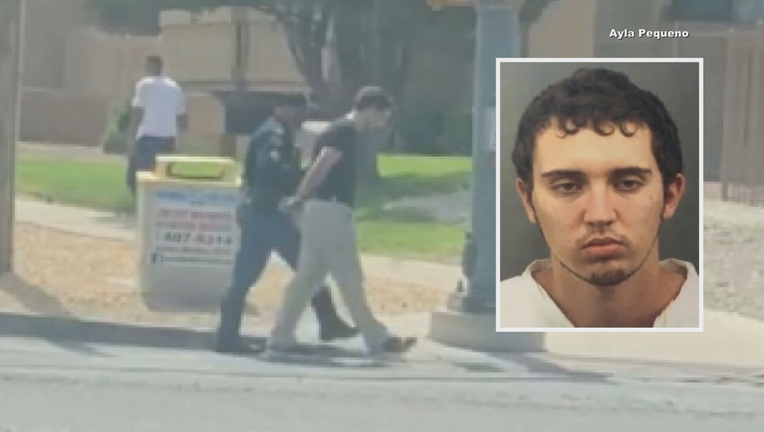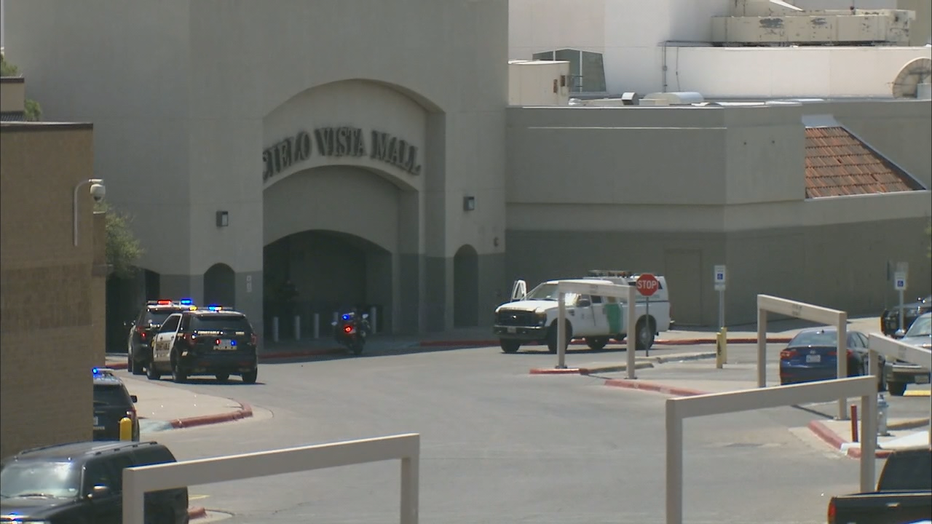'Invasion' language continues after El Paso Walmart shooting

EL PASO, Texas - From inside a Texas Walmart in 2019 during one of the deadliest mass shootings in U.S. history, Adria Gonzalez heard the gunman shout epithets against Mexicans as she helped panicked shoppers toward the store exits.
She won’t be there Wednesday when Patrick Crusius is expected to plead guilty in an El Paso courtroom to federal hate crime and firearms charges for the killing of 23 people. But she is angry federal prosecutors won’t seek the death penalty over a racist attack that, according to investigators, was preceded by the shooter posting an online screed that warned of a "Hispanic invasion" of Texas.
"It's a slap in the face for us Latinos," Gonzalez said.
The expected guilty plea would amount to the first conviction in a case that has dragged on more than three years, and Crusius could still face the death penalty over separate state charges. But for Democrats and immigrant rights groups, there is a separate disappointment: How the description of an "invasion" on the U.S.-Mexico border has continued in American politics even after the El Paso shooting.
From campaign stumps to hearings in Congress, Republicans have increasingly described high numbers of migrant crossings into the U.S. as an invasion threatening public safety and overwhelming border communities. Critics have condemned the characterization as anti-immigrant and dangerous in the aftermath of El Paso and other racially motivated attacks.
The issue flared again Tuesday during a hearing on border security in the House Committee on Oversight and Accountability, where Democrats accused the other side of fanning rhetoric against migrants. Republicans pushed back.
"For my colleagues on the other side of the aisle who want to state that we’re using this hearing for white nationalism, I’m not doing that," said Republican Rep. Byron Donalds of Florida, who is Black.
The Aug. 3, 2019, shooting happened on a busy weekend at a Walmart that is typically popular with shoppers from Mexico and the U.S. In addition to those killed, more than two dozen were injured and hundreds more were scarred by being present or having a loved-one hurt.
Many of the dead and wounded were citizens of Mexico.
Crusius, 24, surrendered to police after the massacre, saying, "I’m the shooter," and that he was targeting Mexicans, according to court records. Prosecutors have said he drove more than 10 hours from his hometown near Dallas to the largely-Latino border city and published a document online shortly before the shooting that said it was "in response to the Hispanic invasion of Texas."
RELATED: North Texas grandparents of El Paso 'domestic terrorism' suspect release statement

Shortly after the shooting, Republican Gov. Greg Abbott came under criticism over a fundraising mailer dated the day before the attack that called on his supporters to "defend Texas" from immigrants entering the country illegally. He responded at the time by saying "mistakes were made" over the mailer, though did not elaborate or assign fault.
But Abbott has more recently embraced using the word "invasion" while authorizing a series of hard-line immigration measures, including a letter to state police and the Texas National Guard in November with the subject line "Defend Texas Against Invasion."
Abbott has defended his statements by saying he is invoking language included in the U.S. Constitution. Some legal scholars have called it a misreading of the clause.
"If this is not an invasion, what is it?" Abbott told CNN's Jake Tapper during an interview last month. "Think about the volume of people coming across the border."
Abbott's office did not return a request seeking comment Tuesday.
Texas state Sen. Roland Gutierrez, a Democrat whose district includes South Texas, said the language needs to stop. "We are not at war here," he said.
America's Voice, an immigration reform group, said it tracked more than 80 Republican candidates during last year's midterm elections who amplified what they called "invasion" and "replacement" conspiracies.
"I think it’s been creeping over the years," said Zachary Mueller, political director of America's Voice. "What I would say is that in 2021, there was a marked shift where it went from the fringes of the Republican Party into the mainstream of the Republican Party."
A database of mass killings in the U.S. since 2006 compiled by The Associated Press, USA Today and Northeastern University shows that the number of deadly mass shootings linked to hate crimes has increased in recent years. Among 13 prominent instances, the 2019 Walmart shooting was the deadliest. The database tracks every mass killing — defined as four dead, not including the offender — in the U.S. since 2006.
It remains unclear when Crusius might still face trial on separate state charges in Texas. Gonzalez, who has been credited with saving lives in the Walmart, believes the death penalty would send a message.
Tending to her 3-month-old infant at home in El Paso, Gonzalez says she lives in fear of further attacks and now carries a small handgun with her for protection after completing firearms training.
"This stays with us, the ones that were inside that Walmart shooting that August morning," she said. "We’re the ones that saw everything, and we’re still hurting inside."
___
Weber reported from Austin, Texas. Associated Press reporters Acacia Coronado and Jake Bleiberg in Dallas contributed to this report.

